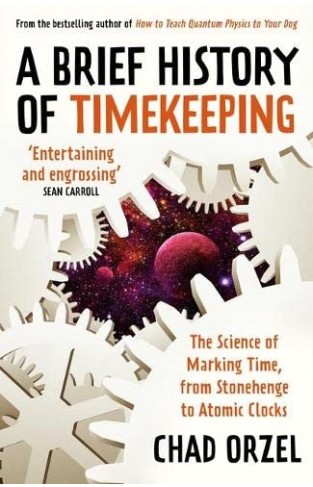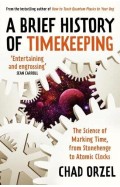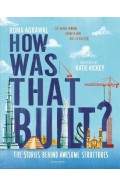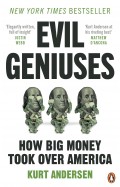- Home
- Books
- Sale
- Let's Read More FLAT 15% OFF
- A Brief History of Timekeeping - The Science of Marking Time, From Stonehenge to Atomic Clocks
A Brief History of Timekeeping - The Science of Marking Time, From Stonehenge to Atomic Clocks
By: Chad Orzel
-
Rs 2,396.25
- Rs 3,195.00
- 25%
You save Rs 798.75.
Due to constant currency fluctuation, prices are subject to change with or without notice.
Entertaining and engrossing’ Sean Carroll
Press the snooze button on your alarm once too often and you soon remember the importance of good timekeeping. That need to tell the time connects you to over five thousand years of human history, from the first solstice markers at Newgrange to quartz crystal oscillating in your watch today. Science underpins time: measuring the movement of Sun, Earth and Moon, and unlocking the mysteries of quantum mechanics and relativity theory – the key to ultra-precise atomic clocks.
Yet time is also socially decided: the Gregorian calendar we use today came out of fraught politics, while the ancient Maya used sophisticated astronomical observations to produce a calendar system unlike any other. In his quirky and accessible style, Chad Orzel reveals the wondrous physics that makes time something we can set, measure and know.
Entertaining and engrossing’ Sean Carroll
Press the snooze button on your alarm once too often and you soon remember the importance of good timekeeping. That need to tell the time connects you to over five thousand years of human history, from the first solstice markers at Newgrange to quartz crystal oscillating in your watch today. Science underpins time: measuring the movement of Sun, Earth and Moon, and unlocking the mysteries of quantum mechanics and relativity theory – the key to ultra-precise atomic clocks.
Yet time is also socially decided: the Gregorian calendar we use today came out of fraught politics, while the ancient Maya used sophisticated astronomical observations to produce a calendar system unlike any other. In his quirky and accessible style, Chad Orzel reveals the wondrous physics that makes time something we can set, measure and know.
A Brief History of Timekeeping - The Science of Marking Time, From Stonehenge to Atomic Clocks
By: Chad Orzel
Rs 2,396.25 Rs 3,195.00 Ex Tax :Rs 2,396.25
Zubin Mehta: A Musical Journey (An Authorized Biography)
By: VOID - Bakhtiar K. Dadabhoy
Rs 472.50 Rs 1,050.00 Ex Tax :Rs 472.50
Exactly What to Say - The Magic Words for Influence and Impact
By: Phil Jones
Rs 3,071.25 Rs 4,095.00 Ex Tax :Rs 3,071.25
How Was That Built? - The Stories Behind Awesome Structures
By: roma agrawal
Rs 2,466.75 Rs 3,795.00 Ex Tax :Rs 2,466.75
A Del of a Life - The Hilarious New Memoir from the National Treasure
By: David Jason
Rs 767.25 Rs 1,395.00 Ex Tax :Rs 767.25
Evil Geniuses - The Unmaking of America - a Recent History
By: Kurt Andersen
Rs 1,881.75 Rs 2,895.00 Ex Tax :Rs 1,881.75
The Origins of Political Order From Prehuman Times to the French RevolutioN
By: Francis Fukuyama
Rs 3,505.50 Rs 3,895.00 Ex Tax :Rs 3,505.50
Manning Up: How the Rise of Women Has Turned Men into Boys
By: Kay Hymowitz
Rs 646.75 Rs 995.00 Ex Tax :Rs 646.75
The Obama Syndrome: Surrender At Home War Abroad
By: Tariq Ali
Rs 1,165.50 Rs 1,295.00 Ex Tax :Rs 1,165.50
The Quest For Meaning: Developing A Philosophy Of Pluralism
By: Tariq Ramadan
Rs 1,255.50 Rs 1,395.00 Ex Tax :Rs 1,255.50
The Pakistan US Conundrum Jihadists The Military And The People The Struggle For Control
By: Yunas Samad
Rs 1,255.50 Rs 1,395.00 Ex Tax :Rs 1,255.50
An Enemy We Created: The Myth Of The Taliban Al Qaeda Merger In Afghanistan 19702010
By: Alex Strick van Linschoten
Rs 3,412.50 Rs 5,250.00 Ex Tax :Rs 3,412.50
WikiLeaks: Inside Julian Assanges War on Secrecy
By: David Leigh & Luke Harding
Rs 552.50 Rs 850.00 Ex Tax :Rs 552.50
Exactly What to Say - The Magic Words for Influence and Impact
By: Phil Jones
Rs 3,071.25 Rs 4,095.00 Ex Tax :Rs 3,071.25
How Was That Built? - The Stories Behind Awesome Structures
By: roma agrawal
Rs 2,466.75 Rs 3,795.00 Ex Tax :Rs 2,466.75
A Del of a Life - The Hilarious New Memoir from the National Treasure
By: David Jason
Rs 767.25 Rs 1,395.00 Ex Tax :Rs 767.25
Evil Geniuses - The Unmaking of America - a Recent History
By: Kurt Andersen
Rs 1,881.75 Rs 2,895.00 Ex Tax :Rs 1,881.75
No recently viewed books available at the moment.
Zubin Mehta: A Musical Journey (An Authorized Biography)
By: VOID - Bakhtiar K. Dadabhoy
Rs 472.50 Rs 1,050.00 Ex Tax :Rs 472.50
A Brief History of Timekeeping - The Science of Marking Time, From Stonehenge to Atomic Clocks
By: Chad Orzel
Rs 2,396.25 Rs 3,195.00 Ex Tax :Rs 2,396.25
Exactly What to Say - The Magic Words for Influence and Impact
By: Phil Jones
Rs 3,071.25 Rs 4,095.00 Ex Tax :Rs 3,071.25
How Was That Built? - The Stories Behind Awesome Structures
By: roma agrawal
Rs 2,466.75 Rs 3,795.00 Ex Tax :Rs 2,466.75
A Del of a Life - The Hilarious New Memoir from the National Treasure
By: David Jason
Rs 767.25 Rs 1,395.00 Ex Tax :Rs 767.25
Evil Geniuses - The Unmaking of America - a Recent History
By: Kurt Andersen
Rs 1,881.75 Rs 2,895.00 Ex Tax :Rs 1,881.75














-120x187.jpg?q6)











-120x187.jpg?q6)



-120x187.jpg?q6)



